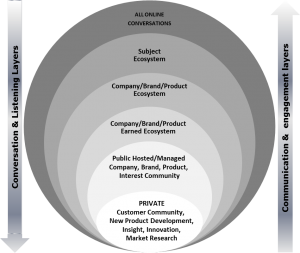Understanding Social Conversation Data
Over the last couple of years, I have worked with a social media monitoring and online community management and market research companies and each one advocates the value of their access and ability to interpret social conversation data, however very few, if any can position themselves in the overall social conversation space. In order to highlight the different layers of social conversations which offer organisations the opportunity to filter and mine social data with the goal of extracting consumer and market insights I have developed the social conversation sphere.

The social conversation sphere highlights 6 layers of online conversations which take place across all social channels including, websites, forums, blogs, social networks, public hosted communities and private communities:
All Online Social Conversations
The largest sphere contains all online social conversations on all subjects across all channels and provides access to the broadest levels of conversation. This area can be used by an organisation to answer a broad question about their company, products, customers, and competitors, current and potential new markets.
For example an organisation may launch a new brand, product or website and after a period of time, they can carry out some broad analysis of conversations to find out customer and market perceptions based on the key themes which emerge from any and all conversation around a particular word or phrase. They may find the key messages have got across successfully and the target customer group are using the product/service as intended or they could find that a different group is using the product in a different way. All findings provide feedback and understanding for an organisation.
Social Media Monitoring tools can be used to filter conversations to narrow down the social data sets. See below for how to select social media monitoring tools.
Subject Ecosystem
The subject ecosystem contains all social data from all social channels filtered by a particular subject area, for example you may be interested in coffee, alcohol, fast food, travel or some other broad subject area. This layer of social data is refined and narrowed down by key search terms which restrict the data set to one which is relevant to this key subject area.
This is where social media monitoring and filtering tools kick in and help you identify subject, segment and market social data sets. See below for how to select social media monitoring tools.
Company/Product/Brand Ecosystem
The company, product, brand or service ecosystem contains all social data from all public social channels, both third party sites and earned ecosystems, which is filtered by a particular company, product, brand or service name. This layer of social data is refined and narrowed down by key search terms relating to your company/brand/product or service, providing the opportunity to extract insight from relevant conversations.
This is where social media monitoring and filtering tools kick in and help you identify data sets relating to your company/brand/product or service. See below for how to select social media monitoring tools.
Earned Company/Product/Brand Ecosystem
An earned ecosystem is one where a company/product/brand or service has garnered public support/engagement across third party public social networks owned and managed by organisations and individuals not associated to the company/brand/product or service. Conversations which take place on an earned ecosystem provide different types of insight to those on hosted or own public and private social networks, as many of these sites offer a level of anonymity and may have different guidelines and moderation services to those managed and hosted by a company.
An earned ecosystem property may be an industry publication or website, an independent blogger, a forum or social network run by a fan or customer, a competitor’s site or a comment on a news of blog item.
This is where social media monitoring and filtering tools kick in and help you identify data sets relating to your company/brand/product or service which take place within the earned ecosystem. See below for how to select social media monitoring tools.
Hosted, Managed and Owned Ecosystem
As more and more current and potential customers use online resources as a means to research companies, brands, products, services and individuals, there are more and more social channels to access both independent information and also platforms for more direct access to a company, brand, product, service or an individual. Companies can and do monitoring conversations across all channels, but may not respond across each and every one, but use their own platforms both on public social networks like Facebook, Twitter and LinkedIn and also public hosted customer communities on their own websites like Dell’s ideastorm.com, Starbucks, mystarbucksidea.com and skys help forum.
This ecosystem provides the opportunity for a company, brand, brand, product, service or individual to have the opportunity to invest more time and resources into facilitating conversations between and with existing and future customers; provide a platform to extract ideas about new products and enhancements to existing products and services and opportunity to reflect back to the community about the actions taken based on feedback in these communities.
This provides a deeper level of insight and provides a test bed for product development ideas, market and campaign messages. There are a number of companies who provide hosted online communities and forums, these include:
Lithium, buddymedia, pluck/demandmedia, liveworld, salesforce,
Private Online Customer Communities
At the heart of the social conversation sphere is private online customer communities, which provide a platform to create in depth on-going conversations with a small group of engaged customers over an extended period of time, this may be anything from a few months around a particular project or over a number of years. These communities bring together customers who are happy to participate in a range of market research activities, the output from which is fed back into an organisations market research, insight and new product development teams, influencing business, marketing and new product development decisions, de-risking innovation and accelerating the success of new product launches.
There are a number of companies who provide Private Online Customer Communities, these include:
Communispace, Vision Critical, Promise Communities, Insites Consulting, Brainjuicer, Facegroup,
Social Media Monitoring Tools
There are a range of Social Media Monitoring Tools and service providers, each of which has its own strengths and weaknesses, some being more suitable for some work than others, a selection of providers include:
Radian6, SDL/SM2, sysomos, neilsen buzzmetrics, visible technologies,
The paper below provides an overview od the key features and functionality of social media monitoring tools and guidance on areas to think about when selecting them.
